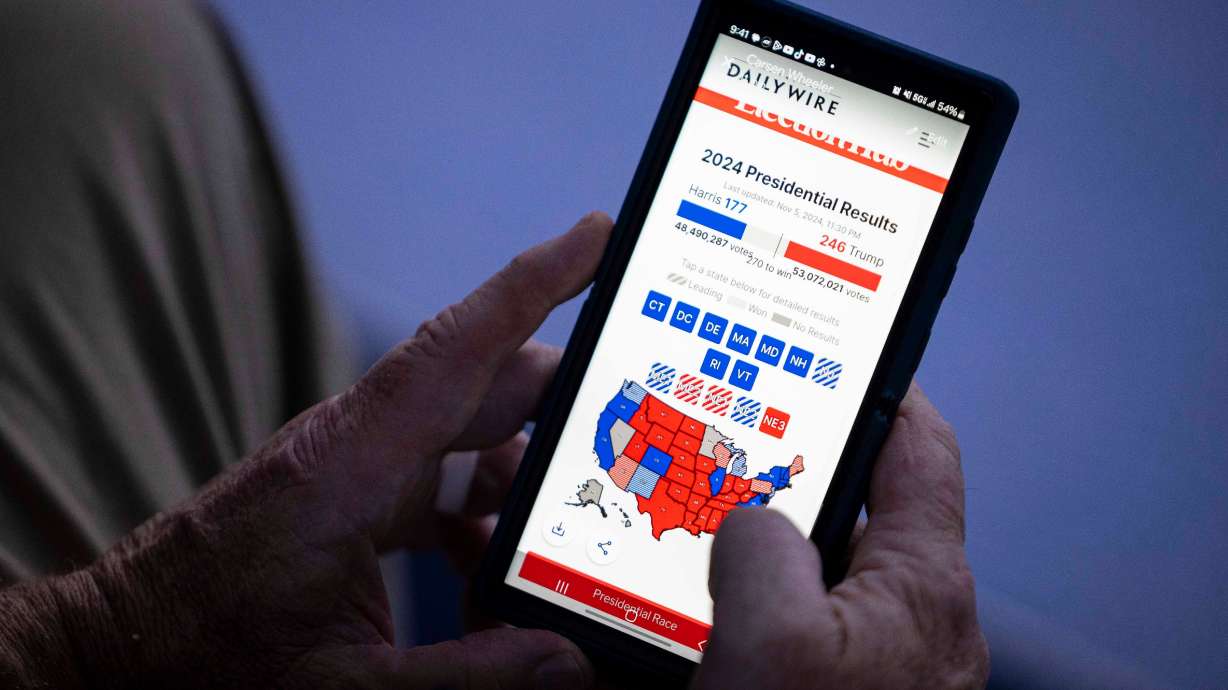Estimated read time: 5-6 minutes
- Utah lawmakers aim to speed up election results, addressing concerns over delays.
- Proposed bills suggest eliminating same-day registration and requiring mail-in ballots by Election Day.
- The changes could increase costs and require new equipment and staff for county clerks.
SALT LAKE CITY — The governor and Republican leaders in the House and Senate haven't come to an agreement yet on how to change the state's vote-by-mail system.
But they all agree the state needs to speed up election results.
In December, Gov. Spencer Cox said the state needs to change its process so results are announced on election night.
"It should not take us two weeks to get answers in most of our races," Cox said.
On Monday, Senate President Stuart Adams, R-Layton, called this a "high priority" and House Speaker Mike Schultz, R-Hooper, called it "critical" to election confidence.
Utah was one of the slowest states in the country to update its election results after the 2024 general election, along with some other western states like Washington and California that also use universal vote-by-mail systems.
The delays — driven by late-arriving mail-in ballots, an extensive ballot curing process and the number of provisional ballots — caused President Donald Trump's vote share in Utah to rise by over 5% in the days and weeks following election night.
Referring to the incomplete poll results, news outlets across the country claimed prematurely that Utah was one of two states in the nation that decreased its support for Trump compared to the 2020 election.
Big changes to election deadlines
One House lawmaker, freshman Rep. Doug Fiefia, R-Herriman, unveiled a bill on Friday that would make several significant changes to voter requirements and county clerk duties to ensure quicker results on Election Day.
For voters, HB445, Revisions to Election Law, would:
- Eliminate same-day registration by restricting provisional ballots to just those whose voter ID or voter registration is challenged.
- Require mail-in ballots to arrive before polls close on election night to be counted.
- Shorten the time period when voters can correct a ballot with a mismatched signature from up to 11 days after Election Day to six days after.
For county election officials, Fiefia's bill would:
- Require the finished tabulation of all ballots received before Election Day to be published on election night.
- Require the finished tabulation of all ballots received on Election Day to be published the following night.
- Require officials to publish the unofficial final election results on the Monday after Election Day.
Fiefia, who represents parts of Herriman, Riverton and South Jordan, told the Deseret News that in a survey of his constituents he found that just 50% were confident in the security of elections, with many respondents citing concerns over slow election results.
"The lack of confidence in our election system can be directly tied to how we report," Fiefia said. "And so that's one thing that I wanted to help instill is confidence and build integrity into our systems."
The lack of confidence in our election system can be directly tied to how we report.
–Rep. Doug Fiefia, R-Herriman
Rep. Norm Thurston, R-Provo, has also introduced a bill that would require a mail-in ballot to be received by an election worker before polls close on Election Day to be considered valid.
On Monday, Senate Majority Assistant Whip Mike McKell, R-Spanish Fork, said that any election reform bill that emerges from the 2025 session needs a "statutory deadline" for county clerks to report election night results.
"Any bill that doesn't have a cut off, I think, is missing the mark," McKell said.
Following the Florida model
Fiefia's reworking of state election code is modeled after Florida, he said, a state that has been recognized for early results on election night despite having a population that is nearly seven times greater than Utah's.
Similar to Florida, Fiefia's bill would push the voter registration deadline from 11 days before Election Day to 29 days before.
California takes an opposite approach and consequently has the slowest election result updates in the country.
In November, the West Coast giant had not counted one-third of its ballots on election night. The state's lenient mail-in ballot arrival deadline and ballot-curing process ensured that final results could not be announced until the 30-day canvass period was completed in December.
But sometimes these long waits are necessary, according to Utah Senate Minority Whip Karen Kwan, D-Murray, who said election policy should "reiterate the importance of voter access and make sure that all of our citizens who are accessing the vote have that ability to do so, even up to that last day, given the constraints with time that we have."
Quick elections are expensive
The bill would also attempt to speed up the ballot curing process by requiring county clerks to call or text a voter instead of using the mail to let them know if their signature was rejected.
Finally, Fiefia's proposal would require the lieutenant governor, who oversees election administration in the state, to award a contract for a standardized voting system to be used by election officials across the state.
"We have 29 clerks that have very different timelines and processes," Fiefia said. "If we're going to get better at elections together as a state, we need to be using the same type of technology."
Weber County Clerk Ricky Hatch, who has been in communication with Fiefia about the bill, said lawmakers should remember that elections can be both accurate and fast only if taxpayers are willing to foot a much larger bill.
In order to meet the tabulation and reporting requirements in the bill, Hatch said clerks would need new equipment and significantly more staff.
"It's going to require a massive amount of labor to meet those deadlines, basically taking what we could do in four days and requiring us to do them in one day," Hatch said.










